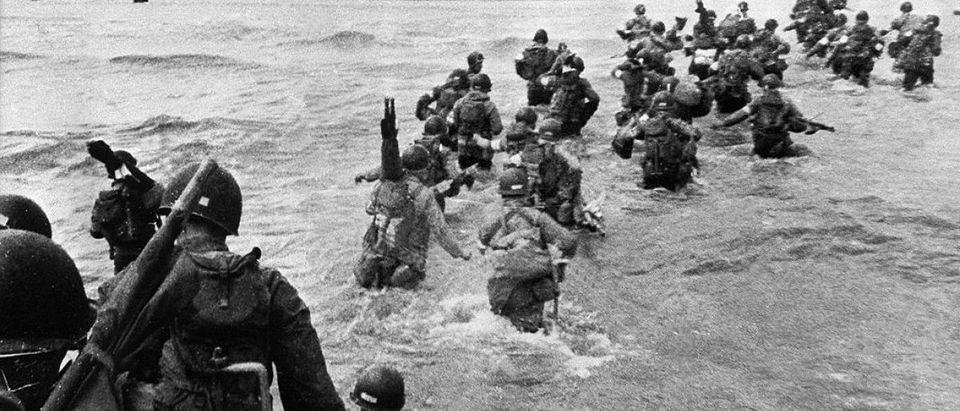Thursday, June 6 marks the 75th anniversary of D-Day, the Allied landings on the Normandy beaches in northern France that launched the major assault against the Nazi occupation of France. D-Day brought the liberation of France: these brave soldiers turned the tide in World War II.
To his credit, ABC News’s David Muir has aired interviews this week with some of the men who stormed those beaches, survived the deadly Nazi gunfire, and are now returning, some for the first time, to commemorate their military service.
At a time when some people may question the importance of democratic freedoms and America’s values, it’s worth contemplating what this anniversary means. If you have never been to the Normandy beaches, you can find online D-Day footage. Watch the video of Ronald Reagan’s moving June 6, 1984, 40th anniversary speech at Pointe du Hoc. Read historian Douglas Brinkley’s short, stirring book, “The Boys of Pointe du Hoc: Ronald Reagan, D-Day, and the U.S. Army 2nd Ranger Battalion.”
Pointe du Hoc is the 100-foot promontory at the top of which were placed six German guns capable of destroying Allied ships in the English Channel. The Army’s 2nd Ranger Battalion scaled those cliffs and destroyed the Nazi weapons.
In October 2012, I visited the Normandy beaches as part of a French-American Foundation excursion. The 40 or so participants met first in Paris, were hosted at a lunch in Le Havre by the city’s mayor, Edouard Philippe (now France’s Prime Minister), and then visited the beaches. The experience was moving and unforgettable. If there was ever a place on the planet that could be called hallowed, sacred ground, this was it.
I went up to Pointe du Hoc and stood at the spot where Reagan gave his famous speech and then turned around, walked to the cliff’s edge, and stared directly down at the beach below. I was experiencing the same perspective of those Nazi soldiers who had trained their machine guns at point blank range on the columns of young American soldiers trying to scale those cliffs.
Two thoughts gripped my mind on that grey, cool, misty morning, with short bursts of wind-driven rain. For the first time in my life, I sensed the presence of pure evil. The terrain was left mostly untouched since the Nazi occupation, with German bunkers still intact. You could enter these concrete fortresses, peer out across the sea, and imagine how the young German soldiers inside were preparing to slaughter the Americans heading for Omaha and the other beaches from battleships crossing the Channel.
The other thought was a profound appreciation for the remarkable courage of those soldiers and their sacrifice for our civilization. They knew many of them would perish that day. It was a humbling experience that brought my heart to my throat and tears to my eyes.
We live in an age of selfies. The young soldiers who stormed the Normandy beaches lived lives of selfless dedication to freedom and democracy. They were, to a man, heroes, every one of them, but they were not there for the heroics. No doubt some of these young men had grand thoughts about good and evil; others were focused on getting the job done, staying alive until the next dawn, and hopefully returning home to their loved ones. Many did not.
The June 6, 1944, casualties exceeded 10,000 men. There’s a graveyard with white crosses where many of those D-Day soldiers are buried, close by the cliffs they conquered.
News stories report that almost 350 World War II veterans are now dying each day. We should take the time to reflect on their bravery. To say “thank you” again and again.
I have met only one D-Day survivor, the late John Whitehead, who returned from France, attended business school, and became co-chairman of Goldman Sachs. He also served as deputy secretary of state in Ronald Reagan’s second term. When I think of John Whitehead, one word comes to mind: avuncular. You’d never know that this wonderful, extremely modest man was a war hero.
What I do know is that if there had been more John Whiteheads on Wall Street, the Great Recession would not have occurred. The boys of Pointe du Hoc and their fellow soldiers were men of character, courage, and integrity. There was no room for greed in their lives. They had met evil face-to-face and survived. They offered their lives to secure our freedom. We owe them everything.
Charles Kolb was deputy assistant to the president for domestic policy in the George H.W. Bush White House from 1990-1992. From 1997-2012, he was president of the nonpartisan, business-led think tank, the Committee for Economic Development.
The views and opinions expressed in this commentary are those of the author and do not reflect the official position of The Daily Caller.


